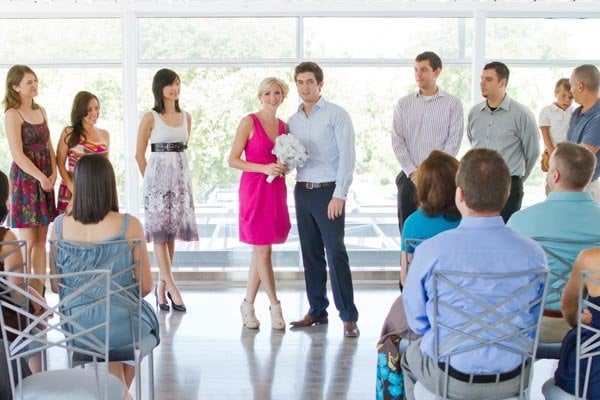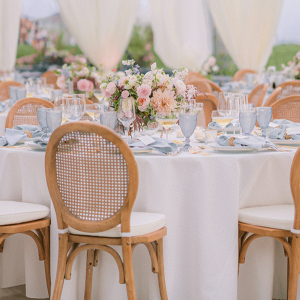What makes a great rehearsal dinner? With these tips, your "practice" party will run as smoothly as the main event.
Many newlywed couples say that the rehearsal dinner, traditionally a way for the bride’s and groom’s families to get acquainted, was their favorite part of the wedding weekend. Why? It’s a celebration that allows you to rejoice and mellow out with your loved ones before the excitement of the big day. Here’s how to pull yours off perfectly.

Photo Credit:Jennifer Weems on Petal Wishes via Lover.ly
When is it?
Even though most people hold their rehearsal dinner on the evening before the wedding immediately following the ceremony run-through, you can choose to have yours whenever it suits you.
Who pays?
Traditionally, the groom’s parents plan and pay for the rehearsal dinner. These days, however, many couples shell out for the shindig themselves or ask both sets of parents to share the cost. If you feel strongly about the venue that’s chosen for the dinner, now is the time to discuss everyone’s plans.
Who's invited?
Your dinner must include: all members of the wedding party (and their spouses or dates); parents of flower girls or ring bearers in the wedding, if the little ones are invited; all parents, stepparents and grandparents of the bride and groom, plus siblings who are not in the wedding party (and their spouses or significant others); and often the officiant and his or her spouse. Out-of-town guests should also be invited, but if you prefer to keep the gathering more intimate, schedule an event for them at another location—perhaps at a restaurant or at the hotel where they’re staying, or informal cocktails at the home of a relative or close friend.
How formal should it be?
The degree of formality is at the discretion of the hosts, but it should never exceed the formality of the actual wedding. Whatever your rehearsal dinner’s style, send invitations after you’ve received wedding RSVPs.
Where do we have it?
Strive to keep it simple. Appropriate places include a restaurant, preferably with a private room; someone’s backyard; or even a clam shack or pizza parlor for a super-casual affair. Be creative, because anything goes as long as you and your guests are relaxed, comfortable and having a good time.
Not-to-miss moments:
- Toasts: The groom’s father, if he is the host, can welcome guests with a formal toast. Ditto the best man. At that point, other well-wishers can take the floor (toasts can be a bit longer and more humorous on this night than at the wedding). Be prepared to rise and thank all of those who have toasted you! Later, you and your fiancé may also want to take a moment to toast each other and to thank your hosts.
- Gifts: Distribute your thank-you presents to the bridesmaids and groomsmen, especially if it’s something you want them to wear at the wedding.
- Performances: If secular readings (a special poem) or popular songs (a favorite of yours from when you were dating) aren’t appropriate for your ceremony, the rehearsal dinner is the perfect time to include them.
- Special Presentations: Many rehearsal dinners feature videos incorporating footage from the bride’s and groom’s pasts. Have a techno-savvy pal set up and display your presentation so that you can enjoy the show.







